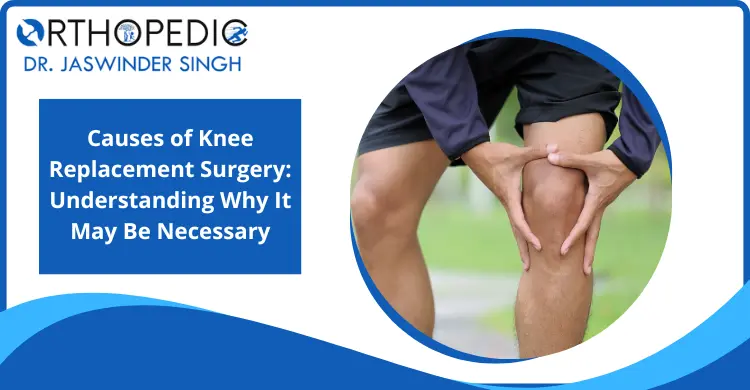
Knee pain can make daily life difficult. When treatments like medications, therapy, or lifestyle changes don’t work, knee replacement surgery might become the best option. But what exactly causes people to undergo this procedure?
In this blog, we’ll explore the major causes of knee replacement surgery, helping you understand why it’s sometimes necessary.
Osteoarthritis is the leading reason for knee replacement surgery. It’s a degenerative joint disease that occurs when the cartilage cushioning your bones wears away. Without cartilage, the bones rub against each other, causing pain, stiffness, and swelling.
When osteoarthritis progresses to an advanced stage, knee replacement surgery is often recommended to relieve pain and restore movement.
Rheumatoid arthritis (RA) is an autoimmune disorder that causes chronic inflammation in the joints. The immune system mistakenly attacks the joint lining, leading to swelling, stiffness, and pain. Over time, the inflammation can destroy cartilage and bone.
If medications and physical therapy fail to provide relief, a knee replacement can improve mobility and reduce pain.
Post-traumatic arthritis occurs after a knee injury such as a fracture, ligament tear, or meniscus injury. Even after treatment, the knee joint may not heal properly, leading to cartilage damage and long-term arthritis.
Knee replacement surgery can restore function when damage becomes severe.
Avascular necrosis (AVN) happens when the blood supply to the knee bone is interrupted. Without sufficient blood flow, the bone tissue dies and collapses, leading to joint destruction.
Knee replacement is often the most effective treatment when AVN progresses.
Want to get a complete understanding of knee replacement surgery, including its types, benefits, costs, and treatments? Read this detailed guide by Dr. Jaswinder Singh and make an informed decision about your joint health!
Some people are born with knee deformities or develop them due to conditions like bow legs or knock knees. These misalignments put extra pressure on the knee joint, wearing down the cartilage.
A knee replacement can correct the deformity and relieve pain.
Conditions like gout, psoriatic arthritis, or lupus can lead to inflammation in the knee joint. Over time, repeated flare-ups can damage cartilage, leading to irreversible joint damage.
In these cases, knee replacement surgery can significantly improve the quality of life.
While obesity itself isn’t a direct cause, it increases the risk of joint damage. Extra body weight puts additional stress on the knees, accelerating cartilage wear and leading to arthritis.
Weight management is often recommended before surgery, but when joint damage is irreversible, knee replacement may be the best option.
Some individuals may have undergone previous knee surgeries or treatments that were unsuccessful. Procedures like arthroscopy or osteotomy may not provide long-term relief, leading to the need for knee replacement.
In such cases, knee replacement becomes the most effective solution.
Understanding the causes of knee replacement surgery can help you make informed decisions about your health. Whether it’s due to osteoarthritis, rheumatoid arthritis, injury, or another condition, knowing the reasons behind the surgery is the first step toward getting the right treatment.
If you’re experiencing knee pain and wondering if surgery is the right choice, consulting an expert is essential. Dr. Jaswinder Singh offers personalized care and treatment plans to help you regain mobility and enjoy a pain-free life.
The most common causes are osteoarthritis, rheumatoid arthritis, post-traumatic arthritis, and severe knee injuries. These conditions damage the cartilage, leading to pain and stiffness that may require knee replacement surgery.
Severe joint pain, limited mobility, and difficulty performing daily activities are the main reasons. When other treatments like medications or therapy don’t help, knee replacement can provide relief.
Conditions like advanced arthritis, previous knee injuries, or deformities can damage the joint, making surgery the best option to restore movement and reduce pain.
When knee pain interferes with simple tasks like walking, climbing stairs, or even resting, and treatments aren’t effective, surgery becomes necessary to improve mobility and quality of life.
Common causes include wear and tear from arthritis, past injuries, bone deformities, and inflammation. When the joint is damaged beyond repair, knee surgery may be the solution.
Fluid buildup, called effusion, can happen due to inflammation, infection, or overactivity after surgery. Rest, ice, and medical advice can usually help manage it.
Chills can be a sign of infection, though sometimes they occur due to anesthesia or medication. It’s best to contact your doctor if you experience chills along with fever or discomfort.
Calf pain may happen due to muscle strain or swelling, but it could also be a sign of a blood clot. If the pain is severe or accompanied by swelling, seek medical attention.
Pain behind the knee can result from scar tissue, nerve irritation, or muscle weakness. Physical therapy often helps, but persistent pain should be evaluated by your doctor.
Pain years later can occur due to implant wear, loosening, or infection. Regular follow-ups with your surgeon can help catch any issues early and ensure your knee remains in good condition.